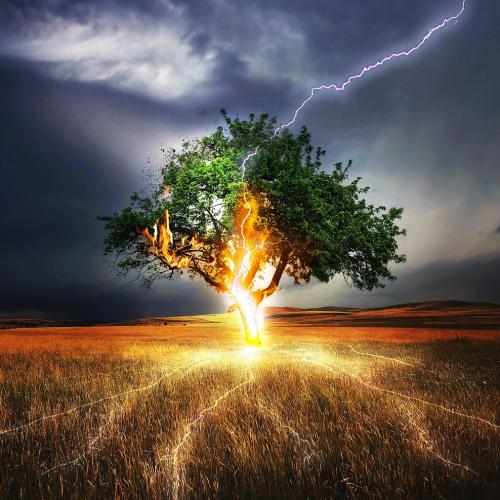

99TravelSafe.com
70 - Safety from Lightning Strikes!


The Website For The Smart and Savvy Traveler
REMEMBER, if you can hear thunder – you are close enough to be struck by lightning!
Plan in advance your evacuation and safety measures! When you first see lightning or hear thunder, activate your emergency plan! Now is the time to go to a building or a vehicle. Lightning often precedes rain, so don't wait for the rain to begin before suspending activities.
Count the number of seconds between a flash of lightning and the next clap of thunder. Divide this number by 5 to determine the distance to the lightning in miles.
Postpone outdoor activities if thunderstorms are imminent! This is your best way to avoid being caught in a dangerous situation.
Stay away from clotheslines (wash lines), fences, and drop your backpacks because they often have metal on them. If you are playing an outdoor activity, wait at least 30 minutes after the last observed lightning strike or thunder!
Avoid water! Avoid the high ground! Avoid open spaces!
Avoid all metal objects including electric wires, fences, machinery, motors, power tools, etc. Unsafe places include underneath canopies, small picnic or rain shelters, or the area near trees. Where possible, find shelter in a substantial building or in a fully enclosed metal vehicle such as a car, truck or a van with the windows completely shut!
If lightning is striking nearby when you are outside, you should crouch down. Put feet together. Place hands over ears to minimize hearing damage from thunder!
Avoid proximity (minimum of 15 ft.) to other people!
Move to a sturdy building or car. Do NOT take shelter in small sheds, under isolated trees, or in convertible automobiles.
Stay AWAY from tall objects such as towers, fences, telephone poles and power lines!
If lightning is occurring and a sturdy shelter is not available, get inside a hard-top automobile and keep the windows up.
Avoid touching any metal. Utility lines and metal pipes can conduct electricity.
Unplug appliances not necessary for obtaining weather information. Avoid using the telephone or any electrical appliances. Use phones only in an emergency!
Swimming, wading, snorkeling and scuba diving are NOT safe. Also, don’t stand in puddles and avoid metal.
Stay in the shelter for 30 minutes from the last heard (or seen) thunder!
AVOID elevated areas like hills, open spaces like rain shelters or open cars, bodies of water like ponds,lakes,streams etc., trees, people and electrical objects!
Do not take a bath or shower during a thunderstorm. Turn off air-conditioners. Power surges from lightning can cause serious damage!
Find a low spot away from trees, fences, and poles. Make sure the place you pick is not subject to flooding.
If you are in the woods, take shelter under the SHORTER trees.
If you feel your skin tingle or your hair stand on ends, squat low to the ground on the balls of your feet. Place your hands over your ears and your head between your knees. Make yourself the smallest target possible and minimize your contact with the ground. Do NOT lie down!
If you are boating or swimming, get to land and find shelter immediately!
If Someone is Struck by Lightning;
People who have been struck by lightning can be CARED for SAFELY, and do NOT carry any type of electrical charge!
Call for help! Get someone to dial the local Emergency Medical Services number.
Look for burn marks on the victim's body where the charge both entered and exited. Lightning strikes can also cause neurological damage, broken bones, and loss of sight or hearing!
(If someone has been struck by lightning), give first aid! If breathing has stopped, begin rescue breathing. If the heart has stopped beating, a trained person should give CPR (Cardio Pulmonary Resuscitation). If the person has a pulse and is breathing, look for and care for other possible injuries
If you are INDOORS;
Avoid water! It’s a great conductor of electricity, so do NOT take a shower, wash your hands, wash dishes or do laundry.
Do not use a corded (landline) telephone. Lightning may strike exterior phone lines.
Do not use electric equipment like computers and appliances during a storm.
Stay away from windows and doors and stay off porches.
Suspend activities for 30 minutes after the last observed lightning or thunder!
